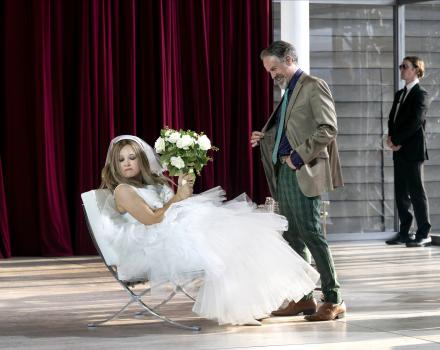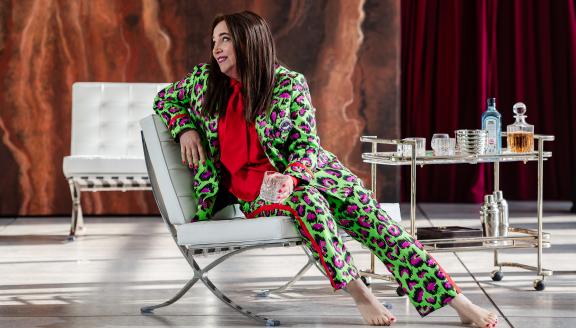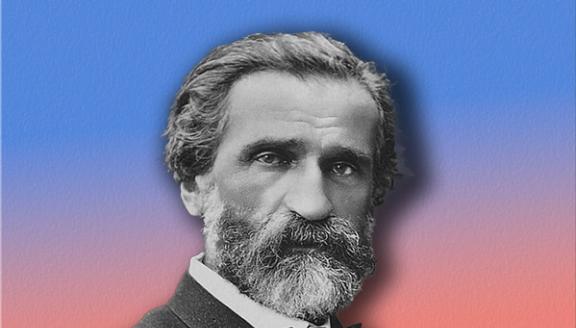
A tale of thwarted love and mistaken and assumed identities, this comedy revolves around an ordinary man becoming ‘King for a Day’. Cavaliere di Belfiore has, to distract attention from the genuine monarch, assumed the identity of King Stanislas of Poland, and arrived with much pomp at the castle of Baron Kelbar near Brest. There he finds himself in the middle of preparations for two weddings: the baron's daughter Giulietta is, most unwillingly, to marry the elderly La Rocca, while a local military official is hoping for the hand of the Marchesa del Poggio. Can ‘King Stanislas’ use his regal power in time to disentangle these unhappy betrothals before his true identity is revealed?
This maelstrom of madness and delusional behaviour, which fills the plot of Un giorno di regno with twists and turns, is a rare thing: a comic opera by Verdi. Written by the composer in his mid-twenties at a time of great personal distress - Verdi’s wife Margherita died the year of its creation (1840), this light-hearted comedy features an impressive virtuosic vocal score. Despite Verdi’s youth, his dramatic skills in portraying character show early promise, along with a flare for rhythmic vitality and glorious composition for the voice. Garsington Opera’s acclaimed production by Christopher Alden is accompanied by the Philharmonia Orchestra conducted by Chris Hopkins.
Cast
In order of singing
|
Il Barone di Kelbar
|
Henry Waddington
|
|---|---|
|
La Rocca
|
Grant Doyle
|
|
Delmonte
|
James Micklethwaite
|
|
Il Cavaliere di Belfiore
|
Joshua Hopkins
|
|
Edoardo di Sanval
|
Oliver Sewell
|
|
La Marchesa del Poggio
|
Christine Rice
|
|
Giulietta di Kelbar
|
Madison Leonard
|
|
Servant
|
Daniel Vening
|
|
Il Conte Ivrea
|
Robert Murray
|
|
Orchestra
|
Philharmonia Orchestra
|
|
Chorus
|
Garsington Opera Chorus
|
| ... | |
|
Music
|
Giuseppe Verdi
|
|---|---|
|
Text
|
Felice Romani
|
|
Conductor
|
Chris Hopkins
|
|
Director
|
Christopher Alden
|
|
Sets
|
Charles Edwards
|
|
Costumes
|
Sue Willmington
|
|
Lights
|
Ben Pickersgill
|
|
Video
|
Matt Vale
Rob Vale
|
|
Choreographer
|
Tim Claydon
|
| ... | |
VIDEOS
STORY
Act 1
The house of Il Barone di Kelbar
Belfiore, for complex reasons of state, is impersonating the Polish king Stanislaus in order to protect him from rivals, and, in this guise, is a guest at the home of Kelbar. Kelbar is intent on engineering the marriage of his daughter Giulietta to the financier La Rocca but she prefers La Rocca’s nephew Edoardo.
A young widow, the Marchesa del Poggio, is in love with Belfiore but has become engaged to Ivrea as Belfiore is unable to commit himself to marrying her.
Knowing that the Marchesa will soon join the house party, and concerned that she might reveal his true identity, Belfiore writes to Stanislaus to ask to be released from his commitment. Edoardo begs the ‘King’ to take him to Poland with him to help him forget his love for Giulietta. When the Marchesa arrives and is introduced to Belfiore as the King she pretends not to recognise him but is determined to test him by declaring her love for Ivrea.
Giulietta is unhappy at the prospect of marrying La Rocca. The Marchesa decides to help her and Edoardo.
Belfiore, in his role as the King, makes La Rocca an offer of promotion if he agrees to marry a rich widow instead of Giulietta. When La Rocca tells Kelbar that he no longer wishes to marry his daughter, Kelbar is outraged and threatens to fight him. The Marchesa proposes that Giulietta and Edoardo should be married at once. The ‘King’ declares that he has a solution that will satisfy everyone.
Act 2
Edoardo is still hoping that he will be able to marry Giulietta. The ‘King’ and La Rocca discover from Giulietta that the chief reason for her father’s opposition to her marriage to Edoardo is the young man’s lack of money. The ‘King’ proposes that La Rocca should resolve this issue by making over a sum of money to Edoardo. La Rocca is reluctant to do so but keen to avoid fighting Kelbar.
The Marchesa cannot understand why the ‘King’ is taking so long to admit his real identity as Belfiore. She tells him that she is definitely going to marry Ivrea. The ‘King’ forbids the marriage for ‘reasons of state’ and announces that he and Ivrea must leave immediately for Poland.
At the height of the confusion a message arrives for Belfiore. It is from King Stanislaus, announcing his safe arrival in Warsaw and releasing Belfiore from his task of impersonating him. Before dropping his disguise the ‘King’ proclaims that Edoardo and Giulietta are to be married and receives Kelbar’s consent. He then reveals his true identity and finally declares his love for the Marchesa.
INSIGHTS
Director Christopher Alden about Un giorno di regno
Verdi’s second opera, Un giorno di regno, or King for a Day, had an initial run of just one single performance at La Scala in 1840—although its fortunes picked up later, and when encountered in modern times audiences clearly enjoy it. How did the director Christopher Alden come to know it?
‘I always knew about this piece’, Christopher told me, ‘because it was a famous flop, and there are also those horrible circumstances in which it was composed – to have to write a comedy within a couple of years of the demise of your whole family. You can understand why Verdi didn’t write another comedy for more than fifty years, until Falstaff.
‘But when you actually start to get into it, you feel that even if the libretto is a little bit on the stock side, the music is really quite inspired and clever – written, of course, in the Rossini-Donizetti opera buffa style, which is a bit of a shock because Verdi later moved so far beyond that.’
Christopher went on to explain that by the time Verdi set the libretto it was indeed something of a throwback. ‘He did try to change it to some degree, and added a few numbers which could push it in a somewhat more human direction.’ There are nevertheless interesting points, he suggests, about the dramatic set-up. ‘Belfiore, the hero of the piece, is a kind of undercover resistance fighter who uses his royal disguise to subvert the plans of the power-hungry men with whom he comes into contact. In his Act One duet with Edoardo, he says, in an aside, “Even if my reign lasts only one day, it will not have been in vain if I can use it to show how ridiculous that insane old man is”, referring to Kelbar, who plots to use his daughter and niece as expendable commodities whose emotional needs will be sacrificed to help him further his megalomaniac ambition. In aiding Giulietta and the Marchesa in their fight to marry for love rather than for status, Belfiore supports these two strong-willed women in their battle to find fulfilment and agency within the patriarchal constraints in which they live.’
Alden finds the timeliness of the libretto exciting, with its subversive hero who sides with its two heroines fighting for empowerment and identity. ‘I’ve always been struck by how effectively comedy can address serious matters. My designer collaborators on this – Charlie Edwards and Sue Willmington – felt as I do that this piece has plenty to say about the morally rudderless world in which we are all living now, with its leaders’ relentless reliance on ego, power and transactional relationships and their focus on celebrity, publicity and social media as the clearest path to achieving their goals. And the plot of Un giorno di regno feels awfully similar to a fantasy which many of us certainly share, the dream of taking the place of a Trump, an Orban or a Putin for just one day, in order to change the course of history.’
George Hall
GALLERY















